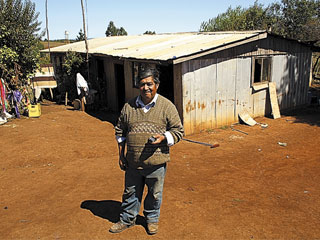By David Dudenhoefer, Today correspondent
Story Published: May 30, 2010

Pascual Pichún, the lonko (traditional leader) of the village of
Temulemu, 30 miles north of the city of Temuco, stood in front of his
home.
The 7.8-magnitude earthquake and tsunamis that battered south-central
Chile in February inflicted widespread suffering on that region’s native
Mapuche. Yet for many Mapuche, the worst natural disaster to hit Chile
in 50 years was just another setback in their decades of struggle to
recuperate lost land and defend their culture.
For Pascual Pichún, the lonko (traditional leader) of the village of
Temulemu, 30 miles north of the city of Temuco, the quake that jolted
him and his family out of their beds in the early hours of Feb. 27 was a
minor blow compared to the news that the police had arrested his
youngest son the day before. His son, also named Pascual, who had
recently returned from seven years of exile in Argentina, was arrested
on a 2002 charge of setting a logging truck on fire – a crime that his
brother Rafael spent five years in prison for. He is now one of
approximately 70 Mapuche in prison as a result of a growing conflict
between Native activists and the Chilean state.
Pichún, who has been arrested several times and has spent five years in
jail, said that he and his sons are innocent of the crimes they’ve been
charged with and that their arrests were in retaliation for his
community’s occupation of land that belonged to a forestry company.
“I will continue to struggle so that my people can have a dignified
life.”
– Pascual Pichún, village of Temulemu lonko (traditional leader)
Pichún was one of the first people to be tried under an anti-terrorism
law dating from the military dictatorship of Augusto Pinochet since the
country’s return to democracy in 1990. Human rights groups have
criticized the Chilean government for using the law – which allows
anonymous witnesses, among other controversial practices – in its
efforts to halt violence by Mapuche radicals.
“They used to say we were lazy and drunks, but now they call us
terrorists,” said Pichún, who speculated that the anonymous witnesses
who testified against him in his trail were paid to do so.
The farms of Temulemu are surrounded by pine and eucalyptus plantations
that supply the country’s pulp, cardboard and wood-product industries.
Between them, Chile’s two biggest forestry companies – Forestal Arauco
and Forestal Mininco – own approximately 4.2 million acres, mostly in
Mapuche territory, that are planted with non-native trees. That is more
than four times as much land as Chile’s Mapuche communities have title
to (less than one million acres).
The Mapuche, who constitute between five and six percent of Chile’s
population, live in farming communities scattered across the country’s
south-central region and in cities, primarily the capital, Santiago.
Mapuche means “people of the land” in their language, Mapudungun, and
their territory once stretched from the Pacific coast of Chile across
the Andes into Argentina. They successfully defended their territory
from the Incan and Spanish empires, but in the late 19th century, the
Chilean and Argentine armies crushed the Mapuche in a series of battles.
According to human rights lawyer Juan Jorge Faundes, the Chilean
government granted the surviving Mapuche communal “mercy titles” for
approximately 1.2 million acres – less than one-tenth of their original
territory – between 1880 and 1929. Subsequent laws facilitated the
division of communal land, further reducing Mapuche holdings, especially
during the Pinochet government. By the time Pinochet relinquished power
in 1990, the Mapuche had half as much land as in 1930.
Faundes, who heads the Fundación Instituto Indígena, founded by the
Catholic church in Temuco, explained that Pinochet’s policies to
dismantle Mapuche communities forced Native leaders to organize
themselves, and once the country returned to democracy, they began
pressuring the government to recover lost land. Whereas democratic
administrations passed a law recognizing Native rights, created the
National Corporation for Indigenous Development (CONADI), and signed the
International Labour Organization’s Convention 169, Faundes noted that
the government’s slow response to Mapuche demands for land and police
repression of Native protests and land occupations have resulted in a
“spiral of violence.”
Dozens of Mapuche communities have occupied land that they claim
ancestral rights to and members of radical groups such as the Arauco
Malleco Coordinating Committee have set fire to tree plantations and
logging trucks and harassed non-Native landowners. The national police
have responded with force, violently evicting Mapuche squatters and
arresting hundreds.
Last August, 24-year-old Mapuche activist Jaime Mendoza was fatally shot
by police during an operation to evict people from “recuperated” land,
and in 2008, 22-year-old Matias Catrileo died under comparable
circumstances. In January, a military tribunal found police officer
Walter Ramirez guilty of fatally shooting Catrileo in the back and
sentenced him to two years of probation.
Pichún, who spent five years in prison for the crime of “terrorist
threat,” said he hopes his son can avoid such a harsh sentence. Yet
despite all that he and his family have suffered, Pichún says he never
considered abandoning his struggle to recuperate Temulemu’s ancestral
land.
“They can’t stop me because behind me there are a lot of people. The
poverty here obliges us to fight.”
Pichún explained the sacrifices haven’t been in vain. The Chilean
government purchased the land that he and his neighbors are occupying
last year and CONADI representatives have told him that the state will
transfer the title to the community this year. He said that aside from
getting his son out of jail, his priority is figuring out how his
community can make best use of that land, most of which remains covered
with pines.
“I will continue to struggle so that my people can have a dignified
life.”
© 1998 - 2010 Indian Country Today. All Rights Reserved To subscribe or visit go to: http://www.indiancountry.com